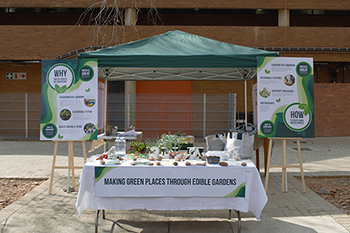Teaching the youth community-based research and transversal skills is a valuable investment in the future. It not only benefits the individual by providing practical skills and a sense of purpose, but also contributes to the growth and well-being of the community. This approach helps generate informed, engaged, and responsible citizens who can actively contribute to improving their communities.
In this spirit, the North-West University (NWU) hosted its first Youth Learning Festival at the Potchefstroom Campus on 18 August.
The festival’s purpose was to provide a platform where both the university and community could share their knowledge and skills with young people, most of whom have left school and are not in employment or pursuing further training.
The organisers were Prof Lesley Wood, project leader and extraordinary professor in the research focus area Community-based Educational Research (COMBER), and Bibi Bouwman, director for sustainability and community impact.
They are leading a project funded by the National Research Foundation and Department of Science and Innovation (NRF /DSI) which focuses on developing the assets of unemployed young people so that they can plough back their knowledge and skills into the community.
Approximately 70 youth from Khuma and Mandawana, the two communities involved in this project, attended the festival.
Seventeen stall holders from various faculties and community groups held 30-minute workshops on a rotating basis to allow the young people to visit all the stalls and exhibits.
Science shop creates problem-solving partnerships
The NRF/DSI funding was also used to set up a science shop. A science shop offers the community access to scientific knowledge and research by partnering with academics to achieve social and environmental improvement. It is a facility, often attached to a specific university department, that provides independent, free, participatory research support in response to concerns and issues experienced by civil society.
The work of a science shop can be described as community-based research. This stems from the premise that all public universities, including the NWU, are in the community, for the community and therefore should serve the community.
“This science shop is like a virtual shop which will be situated within the Community Engagement Office. If you are dealing with problems such as gender-based violence or food security issues within your community or any other issue, you can visit the Community Engagement Office and seek help, and they will partner you with someone or a specific unit within the university so that together you can take action to solve your problems,” explains Prof Wood.
Festival stallholders shared skills
At the learning festival, stalls were set up in Lovers’ Lane on the Potchefstroom Campus. Each stallholder gave a brief introduction of the skills offered, including digital coding and robotics (Faculty of Natural and Agricultural Sciences), entrepreneurship (community members), career guidance (NWU Career Centre), and recycling and environmental preservation (The Green Team: Faculty of Natural and Agricultural Sciences).
Other offerings included artistic creations (Faculty of Humanities), life skills, health and wellbeing (Faculty of Health Sciences), and food security (Faculty of Natural and Agricultural Sciences).
Neo Nkhumane, a third-year BA Communication student, attended the learning festival and said that the themes and topics combatted problems and issues that South Africans are currently facing.
“This science shop is an important element in helping us tackle important issues, and this is a step in the right direction, especially because there are so many young people in attendance. We are grateful to the two project leaders who made this possible.”
Listen to Prof Lesley Wood explaining more about the Youth Learning Festival.



Some of the learning festival stalls were set up in Lovers’ Lane on the Potchefstroom Campus.
